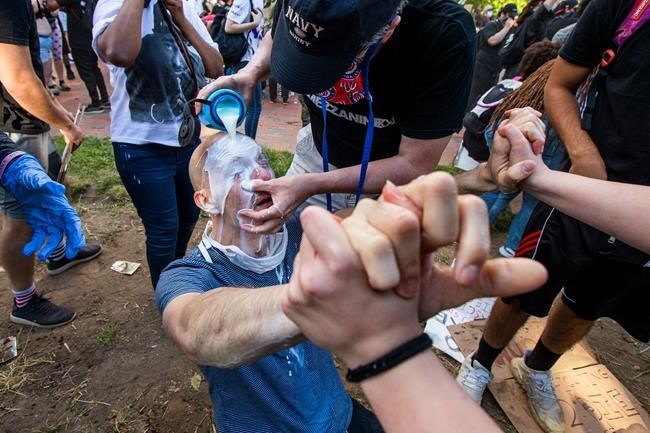Carla K. Johnson

FILE - In this May 31, 2020, file photo, milk is poured into a demonstrator's eyes to neutralize the effect of pepper spray during a rally at Lafayette Park near the White House in Washington. Police deployment of tear gas, pepper spray and chemical agents on protesters has raised concern that the practice may have increased the spread of the coronavirus. (AP Photo/Manuel Balce Ceneta, File)
June 08, 2020 - 11:21 AM
Police departments have used tear gas and pepper spray on protesters in recent weeks, raising concern that the chemical agents could increase the spread of the coronavirus.
The chemicals are designed to irritate the mucous membranes of the eyes, nose and throat. They make people cough, sneeze and pull off their masks as they try to breathe.
Medical experts say those rushing to help people sprayed by tear gas could come into close contact with someone already infected with the virus who is coughing infectious particles. Also, those not already infected could be in more danger of getting sick because of irritation to their respiratory tracts.
There's no research on tear gas and COVID-19 specifically, because the virus is too new. But a few years ago, Joseph Hout, then an active duty Army officer, conducted a study of 6,723 Army recruits exposed to a riot control gas during basic training. The study found a link between that exposure and doctors diagnosing acute respiratory illnesses.
Could tear gas lead to an increase in coronavirus infections? “I think it’s plausible, yes,” Hout said Monday.
The gases and sprays “by their nature, make you cough, sneeze and excrete fluids,” said Hout, now employed by Fairfax, Virginia-based Knowesis Inc., a private contractor.
“If there is a person who is positive for the virus, I can see them coughing on someone else and spreading it that way," Hout said. "Another less likely way is through irritation of the respiratory system. It could create an environment for opportunistic infection in the body.”
Last week, more than 1,000 medical professionals and students signed a letter urging public health officials to oppose any use of “tear gas, smoke, or other respiratory irritants, which could increase risk for COVID-19 by making the respiratory tract more susceptible to infection, exacerbating existing inflammation, and inducing coughing.”
In the U.S., mayors in Portland, Oregon, and Seattle have ordered limits on the use of one common gas for crowd control. A judge in Denver imposed restrictions on the use of chemical weapons by police. And officials in Pittsburgh, New Orleans and Washington, D.C., have proposed bans or limits on tear gas use.
As protests over the death of George Floyd and other black Americans killed by law enforcement continue, it will take weeks before the effect might show up in rising COVID-19 case numbers. If cases increase, there are other factors that could share the blame, such as shouting, singing and, for thousands who were arrested, being confined in close spaces with others.
___
The Associated Press Health and Science Department receives support from the Howard Hughes Medical Institute’s Department of Science Education. The AP is solely responsible for all content.
News from © The Associated Press, 2020